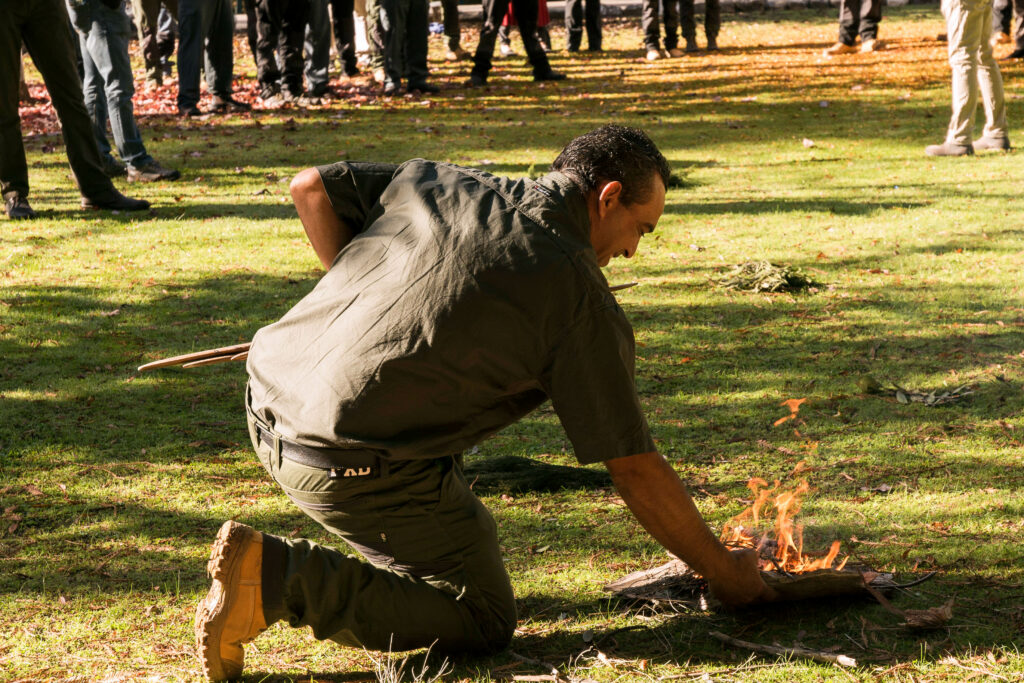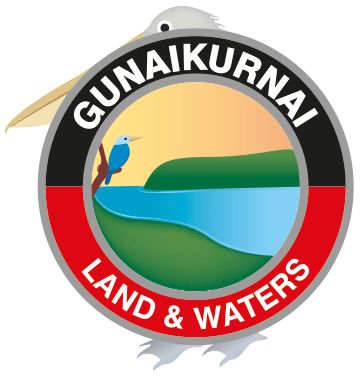Cultural Services
Acknowledgement and cultural awareness of the Welcome to Country tradition and associated cultural traditions, enables Gunaikurnai people to fulfil our responsibilities with respect to the land and to maintain and strengthen our culture.
Cultural Traditions & Protocols
Under our traditional laws and customs, the Gunaikurnai people have a responsibility to welcome visitors to Country – by fire, smoke, water ceremonies and with other specific cultural details including language, customs, protocols, relevant dreaming stories etc.
All requests to conduct a Welcome to Country within the Gunaikurnai RAP Area are to be made through the GLaWAC Cultural Hub.
In addition to conducting traditional ceremonies, GLaWAC offers cultural education sessions and cultural consultation services.
If you are interested in our cultural services please ensure that you read the FAQs below before you book, and feel free to contact the Cultural Hub on 5152 5100 to discuss the most appropriate ceremony for your event, subject to availability.

Traditional Ceremony
Welcome to Country
$500
Welcome to Country is a way of recognising and paying respect to our people as well as acknowledging our ongoing connection to Country.
It is a ceremony performed by an Elder, or an appropriate person nominated as a GLaWAC representative*, as an oral welcome where visitors are greeted and traditionally offered safe passage through our land.
Each Welcome to Country is unique, reflecting cultural protocols and the experiences of the attending Elder, and should be afforded the appropriate respect.
*Please read below for more about how to respect ceremony
Smoking Ceremony
$500
A Smoking Ceremony is an ancient custom that involves smouldering various native plants to produce smoke with cleansing properties to ward off any bad spirits.
When booking a Smoking Ceremony, it is customary to include a Welcome to Country. Please note that this will incur an additional fee.
A Smoking Ceremony is not always appropriate for an event. Requests may need to be discussed with the Cultural Hub before confirmation is given.
Cultural Education
Cultural Education Session
(schools)
$500 per function
A Gunaikurnai representative will come and talk about Aboriginal history, culture and heritage. This session is for ½ an hour. Sessions can be arranged at another location however, travel costs would be incurred.
Cultural Awareness Session
<10 people
$200 per person
10-20 people
$2500 set fee
A Cultural Heritage presentation by a GLaWAC representative educating the knowledge and understanding of the Gunaikurnai culture. This session includes a presentation in-house at GLaWAC office and a field trip to a place of significant (on-Country).
Sessions can be arranged at another requested location however, travel costs would be incurred.
Cultural Consultation
Cultural Consultations
Price on application
It is considered respectful protocol to engage with Traditional Owners to seek permission for the use of their Indigenous Cultural Intellectual Property (ICIP).
This includes, but is not limited to, cultural knowledge, traditional language or artwork used in planned or existing projects including displays and interpretive signage, research or other initiatives that occur on their lands.
Many stakeholders are interested in engaging with Traditional Owners and the best way to achieve this is through a respectful consultation process.
The Cultural Hub facilitates a process for stakeholders to engage in meaningful dialogue with the Gunaikurnai about initiatives that occur on Gunaikurnai Country and the release of their Indigenous Cultural Intellectual Property.
Please note that cultural consultations may require more than one meeting and the consideration of Elders and community. We request your understanding that these matters may take several weeks, and occasionally beyond a month, to be determined.
FAQs
The Victorian Constitution and the Charter of Human Rights and Responsibilities
The State of Victoria recognises in its constitution that Victoria’s Aboriginal people are the original custodians of the land on which the Colony of Victoria was established. Affirming the unique status of Victoria’s Aboriginal people as the descendants of Australia’s first people, the Victorian constitution also recognises the spiritual, social, cultural and economic relationship that the Aboriginal people of Victoria have with their traditional lands and waters within Victoria.
Conducting Welcome to Country and acknowledging Gunaikurnai people as the Traditional Owners of the land provides a means for publically recognising the prior and continued ownership of the land by Gunaikurnai people. Public recognition of our status as Traditional Owners reflects the acknowledgement by the State of Victoria, in its constitution, that the establishment of the Colony of Victoria as a self-governing colony with responsible government occurred without proper consultation, recognition or involvement of the Aboriginal people of Victoria. In this respect, the public recognition of Gunaikurnai people as traditional owners provides a measure of justice to our people who were unlawfully dispossessed of their land.
Conducting Welcome to Country and acknowledging Gunaikurnai people as traditional owners is also necessary to ensure our people receive equal protection under the law of Victoria, a human right guaranteed to all Victorians under the Victorian Charter of Human Rights and Responsibilities. The Charter also recognises the special importance of human rights for the Aboriginal people of Victoria, and that Aboriginal persons hold distinct cultural rights with other members of their community.
These rights include the enjoyment of our identity and culture, the maintenance and use of our language, the maintenance of our kinship ties and the maintenance of our distinctive spiritual, material and economic relationship with the land and waters and other resources with which we have a connection under traditional laws and customs. Conducting a Welcome to Country and acknowledging Gunaikurnai people as Traditional Owners is necessary to enable the realisation of these cultural rights and to promote the health and well-being of Gunaikurnai people generally, recognising that cultural survival is a key determinant of the health and well-being of Indigenous people.
Gunaikurnai Acknowledgement, Awareness and Welcome to Country Protocol
This protocol is applicable to all cultural ceremonies within Gunaikurnai region including Welcome to Country, acknowledgements of the Gunaikurnai people as the Traditional Owners, and cultural awareness programs that occur within our Agreement Area.
The protocol is between the State of Victoria and Gunaikurnai Land and Waters Aboriginal Corporation (‘GLaWAC’) and applies to all State agencies, statutory authorities and their service providers. Local government, the Commonwealth and Commonwealth statutory authorities and agencies are also encouraged to adopt the Protocol as are private businesses and commercial operations.
What’s the difference between a Welcome and an Acknowledgement?
A Welcome to Country is an important ceremony that is delivered by an appropriate Gunaikurnai representative as an oral welcome where visitors are greeted and traditionally offered safe passage through our land.
An Acknowledgement of the Gunaikurnai Traditional Owners is required to be given at the commencement of all major official events occurring within Gunaikurnai Country. It is delivered by a non-Gunaikurnai person to reflect respect and appreciation for meeting/working/being on our Country.
An Acknowledgement is a deeply personal statement reflecting the thoughts of the individual speaking, without speaking on behalf of Traditional Owners.
When is a Welcome to Country to be conducted?
A Welcome to Country is to be conducted for all major official events occurring within the Agreement Area, where members of the public, representatives of government and/or the media are present unless determined by GLaWAC to be inappropriate.
Such events may include but are not limited to:
i. community Cabinet meetings and Parliamentary committee sittings;
ii. commemorations and major festivals;
iii. major launches of government policies and programs;
iv. conferences held or sponsored by the Victorian Government;
v. international events of which the Victorian Government is an organiser or sponsor;
vi. citizenship ceremonies; and
vii. major and international sporting events.
viii. major and international artistic events including exhibitions and performances
ix. events at schools and educational institutions
At events which are not official events, but where a State government body or agency is a sponsor, the relevant body or agency should facilitate negotiations with GLaWAC and the event organiser to incorporate a Welcome to Country into the event, where GLaWAC holds the view that this is appropriate.
Other private organisations or members of the public may also request that a Welcome to Country be conducted.
Who is to conduct a Welcome to Country or Traditional Ceremony?
A Welcome to Country or Traditional Ceremony may only be conducted by an Elder or Gunaikurnai person deemed to be appropriate by GLaWAC. GLaWAC is committed to engaging members across all family groups in cultural heritage work when determining who is an appropriate person.
A business, agency or community group may request that a particular Traditional Owner perform the work if they have a relationship with them. All reasonable attempts will be made to meet their request, however, if no request is made then GLaWAC will select a person suitable for the relevant event.
Respecting a Welcome to Country or Traditional Ceremony
A Welcome to Country is a traditional custom of cultural significance to Gunaikurnai people as such it is important that appropriate respect be given to those conducting a Welcome to Country. Visitors to Gunaikurnai country should show their respect for the continuing culture and traditions of Gunaikurnai people in their traditional Country by observing cultural etiquette. This etiquette shall be advised, if necessary at the time of a Welcome to Country booking.
The Cultural Hub invite you to consider why you have booked or attended a traditional ceremony and ask that you remain respectful and show your appreciation at the end of the ceremony.
Notice required when requesting a Traditional Ceremony or Cultural Education
A request made to GLaWAC, to conduct a Welcome to Country, traditional ceremony or cultural education must be made with a minimum of two (2) weeks prior to the date of the event at which the ceremony is to be conducted. Where the required notice is given, GLaWAC is to respond to the request within a reasonable time. This time will be no less than two (2) business days after the initial request.
Cultural consultations may require more than one meeting and the consideration of Elders and community. We request your understanding that these matters may take several weeks, and occassionally beyond a month, to be determined.
Fees involved in conducting a Traditional Ceremony or Cultural Education
Where GLaWAC approves a request to conduct a traditional ceremony or cultural education/consultation, it will advise those making the request of the relevant fee involved. Fees for conducting a traditional ceremony or cultural education are listed above and reviewed annually. Where work is cancelled within 48 hours of the scheduled event, GLaWAC will charge 50% of the rate, with booked presenters being paid appropriately.
All fees are subject to 10% GST and will be charged accordingly.
Can I film or photograph a Traditional Ceremony?
A traditional ceremony is an individual expression created by the person conducting it and due respect should be given to its intent at all times.
A cultural service is generally not for public broadcast (this includes social media). Requests to film/photograph a traditional ceremony should be made when booking a cultural service.
Please note that a request does not guarantee approval.
Acknowledgement of the Gunaikurnai as Traditional Owners
An Acknowledgement of the Gunaikurnai people as Traditional Owners is required at the commencement of all major official events occurring on Gunaikurnai Country, and should be included at the beginning of all documents relating to Gunaikurnai Country.
An Acknowledgement is a deeply personal statement of respect and appreciation and should reflect the thoughts of the individual speaking. It should not speak on behalf of Traditional Owners.
As a base, the following words should be used when acknowledging the Gunaikurnai people as the Traditional Owners of Country:
“I would like to acknowledge the Gunaikurnai People as the Traditional Owners of the land on which we are gathered, and pay my respects to their Elders past and present, and future”.
Other examples include:
“I would like to acknowledge the Gunaikurnai People as the Traditional Owners of the land on which we live, work and play. I pay my respects to their Elders past and present, and future – for they hold the memories, traditions, culture, and hopes of their community.”
“I would like to acknowledge the Gunaikurnai People as the Traditional Owners of the land on which we are gathered and pay respect to Elders past, present, and future. I would like to recognise their continuing connection to the land, water, air and sky, acknowledging that sovereignty was never ceded.”
*In this region, GLaWAC represents people recognised as Traditional Owners under the Native Title Consent Determination from the Brabralung, Brataualung, Brayakaulung, Krauatungalung and Tatungalung clans.




